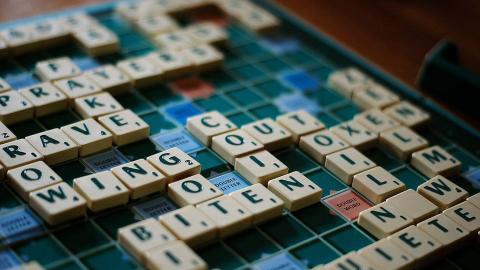Board and card games that will boost your vocabulary

Credit: thebarrowboy / Flickr
- There are many benefits to developing one’s vocabulary beyond just sounding smarter.
- A stronger vocabulary can boost confidence, improve comprehension, and make you a better communicator.
- The entire family can learn and practice new words with these fun games.
Building a larger vocabulary is about much more than being able to impress people with big words. Francie Alexander, VP and chief academic officer for Scholastic Education, wrote about three reasons why a strong vocabulary is critical to reading success. Alexander writes specifically for teachers with children pre-K through 8th grade in mind, but the ideas apply for people of all ages. The first is comprehension. “Comprehension improves when you know what the words mean,” says Alexander. “Since comprehension is the ultimate goal of reading, you cannot overestimate the importance of vocabulary development.” The second reason is communication. “Words are the currency of communication. A robust vocabulary improves all areas of communication — listening, speaking, reading and writing.”
The third reason is a big one. “How many times have you asked your students or your own children to ‘use your words’?” Alexander asks. “When children and adolescents improve their vocabulary, their academic and social confidence and competence improve, too.”
And that’s only scratching the surface. There are many benefits to having a larger vocabulary, from standardized testing performance to getting through a dense novel without checking a dictionary every five minutes. There are also many ways one can build their vocabulary. For this list, we chose a category that combines learning, fun, and a communal element: games. Here are six board and card games that will help the entire family boost their confidence, become better communicators, and improve their reading comprehension.
Geared toward a slightly younger demographic (ages 7 and up) but great for the entire family, this card game uses fun prompts to encourage players to exercise their brains and use their growing vocabulary. More difficult letters are worth more points, and there is no board or complicated rules to follow.
A twist on the classic single player activity, WordSearch is a 2-4 player game that features a circular board that rotates to reveal one of 464 words. Once revealed, players race to find the word and place their tiles on it first. As the game goes on, there are opportunities to remove tiles played by your opponents and replace them with your own. The player with the most tiles on the board at the end wins. The board game comes with 16 different puzzles, with the option to customize puzzles online and print them out yourself. WordSearch is rated ages 7 and up.
According to the online Scrabble FAQ, there are over 100,000 two- to eight-letter words in most recent edition of “The Official Scrabble Players Dictionary.” Playing against other people (or just studying the dictionary) will teach you new words and help you improve your score. There are of course game apps that are very similar, but sitting down with family or friends around a classic Scrabble board is something that can’t be replicated on a phone.
Shake it up and see how many words you can find in three minutes! The 5×5 grid with big visible letters makes it easier for players of all ages to see. The larger grid compared to standard Boggle means there are millions more possible tile arrangements, which means that you can play it for years and years.
The scoring system in Scattergories, which penalizes players who use the same word for a prompt and rewards those who provide unique responses, makes it perfect for committing new words to memory. You’re learning from those around you and, if you wish to get better, paying more attention to language outside of the game so that you score higher on your next match.
All you need to know is in the name of the game. If you can guess the meaning of words like “transmogrify” and “salubrious” from a choice of three definitions you earn 1 point, but if you can define the word without help you earn double points. There are 300 cards with 700 words, as well as an additional 50 cards for younger players.
When you buy something through a link in this article or from our shop, Big Think earns a small commission. Thank you for supporting our team’s work.





